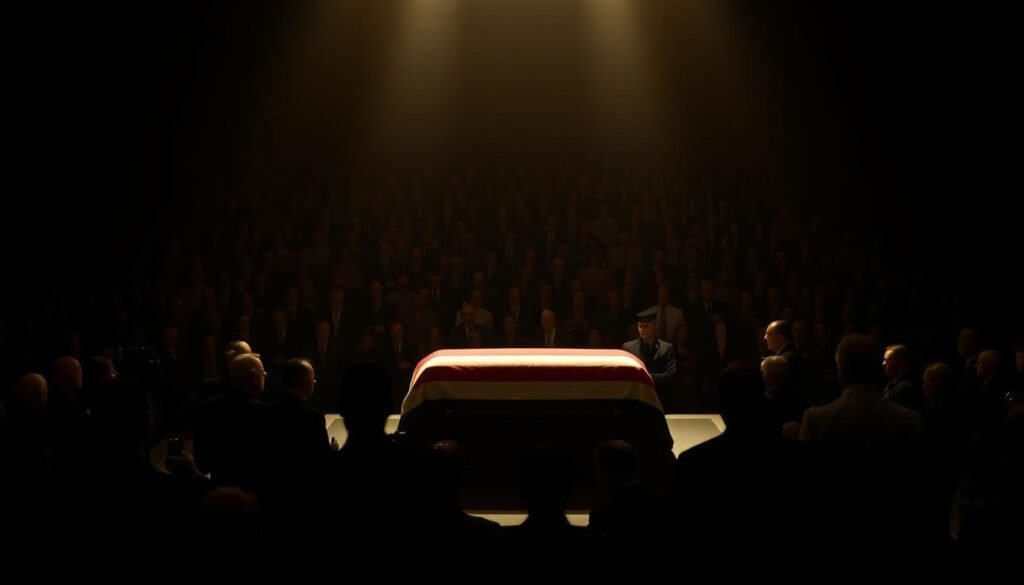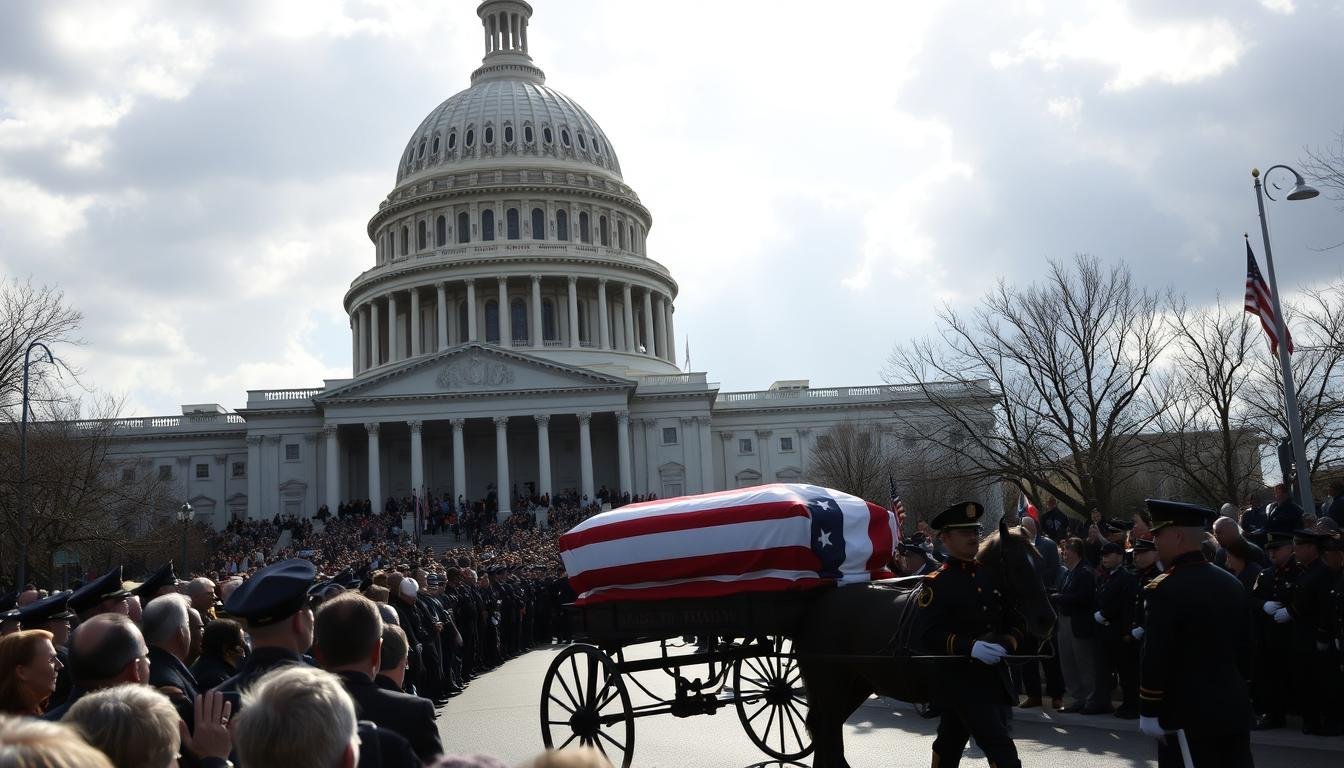Can a Former President Refuse a State Funeral? State funerals in the United States are a long-standing tradition. They honor the lives and service of former presidents. These grand ceremonies show the nation’s respect and gratitude. But, what if a former president doesn’t want this honor?
Whether a former US president can refuse a state funeral is a complex question. It involves understanding US presidential funeral traditions and the rules around these events. As we explore this topic, you’ll learn about the details of presidential funerals and the considerations involved.
Let’s dive into the specifics and look at the customs and laws that govern state funerals for former presidents.
Contents
- 1 What Is a Presidential State Funeral?
- 2 The Protocol of Presidential Funerals
- 3 Can a Former President Refuse a State Funeral?
- 4 The Planning Process for Presidential Funerals
- 5 Historical Examples of Presidential Funeral Choices
- 6 Alternatives to Traditional State Funerals
- 7 Public and Political Implications of Funeral Choices
- 8 Understanding the Complexities of Presidential Funerals
- 9 FAQ: Can a Former President Refuse a State Funeral?
- 9.1 What is a state funeral, and who is eligible to receive one?
- 9.2 Can a former president or their family decline a state funeral?
- 9.3 What role do executive orders play in determining the protocol for a presidential funeral?
- 9.4 How are presidential funerals planned and coordinated?
- 9.5 What are some alternatives to traditional state funerals that a former president or their family might consider?
- 9.6 How do the choices made regarding a former president’s funeral impact their legacy?
- 9.7 What is the significance of a “Letter of Instruction” in the context of a presidential funeral?
- 9.8 How do military officials contribute to the planning and execution of a presidential funeral?
What Is a Presidential State Funeral?
When a former President dies, a state funeral is held. It’s a grand ceremony to honor their life and service. This tradition shows the nation’s respect and thanks for their contributions. [Can a Former President Refuse a State Funeral?]
The state funeral follows strict rules and customs. It involves the military, Congress, and the White House. From the moment of death to the burial, every step is guided by tradition.
US funeral traditions for Presidents are filled with history and meaning. They reflect the country’s values and respect for its leaders. Knowing these customs helps us understand the importance of a state funeral in honoring a President’s legacy.
The Protocol of Presidential Funerals
The rules for presidential funerals are filled with tradition. They involve many government and military officials. It’s interesting to learn that these rules ensure a respectful ceremony.
The funeral protocol includes several important parts. These are the preparation of the deceased, the role of the military, and the presence of government officials. The military plays a significant role, with different branches taking part in the funeral.
| Protocol Element | Description | Responsible Entity |
|---|---|---|
| Preparation of the Deceased | Preparation and dressing of the former President | Family and funeral directors |
| Military Participation | Honor guards, pallbearers, and ceremonial units | U.S. Military Branches |
| Government Participation | Attendance and eulogies by government officials | Government Officials |
It’s made to honor the President’s office and give a respectful goodbye.
Can a Former President Refuse a State Funeral?
It’s a complex question whether a former president can say no to a state funeral. It involves legal and procedural aspects. You might wonder about the protocols for such big events.
A state funeral honors a former president. It includes government officials, dignitaries, and public mourning. The decision to have a state funeral can depend on the former president’s wishes or their family’s.
Executive orders are key in funeral procedures. These orders outline specific protocols and guidelines to follow. But, they don’t always decide on a state funeral. [Can a Former President Refuse a State Funeral?]
Family Decision-Making Authority
The family of the former president has a big say in accepting or refusing a state funeral. Their choice might be based on the former president’s wishes, family traditions, and personal thoughts. This shows how personal wishes and ceremonial rules can clash.
In summary, a former president’s choice to refuse a state funeral is complex. It involves legal rules, executive orders, and family decisions. Understanding these aspects is key to seeing the funeral choices for former presidents’ complexities.
The Planning Process for Presidential Funerals
Planning a presidential funeral is a detailed and complex task. It involves many steps and stakeholders. You might wonder how such a big event is organized. The process starts with a detailed plan, covering the ceremony, burial, and reception.
The planning is guided by a document called the “Letter of Instruction.”
The “Letter of Instruction”
This letter is made by the former president or their family. It outlines their wishes for the funeral. It might include the ceremony type, burial site, and special rituals. The “Letter of Instruction” is key for those organizing the funeral.
Coordination with military officials is also crucial in planning. [Can a Former President Refuse a State Funeral?]
Coordination with Military Officials
Military officials are key in presidential funerals. They ensure the event is dignified and respectful. They arrange for military honors, like a 21-gun salute, and coordinate military participation. Working with military officials is vital to follow all protocols and traditions.

Planning a presidential funeral is a complex task. It needs careful coordination and attention to detail. Understanding the key elements shows the importance of this event. It honors the former president with dignity and respect.
Historical Examples of Presidential Funeral Choices
Presidential funerals are unique, shaped by the wishes of the deceased and their legacy. The funeral choices for former presidents have varied greatly. This shows their personal preferences and the traditions of their time.
The funerals of Richard Nixon and Ronald Reagan are great examples. Each was held with respect for the former president’s wishes and their families.
Nixon’s Case Study
Richard Nixon’s funeral was simple, as he preferred it. It was attended by dignitaries and world leaders. This showed the respect he earned during and after his presidency.
Reagan’s Personalized Ceremony
Ronald Reagan’s funeral was grand, celebrating his life and legacy. It was a state funeral with full honors. This honored his role as the “Great Communicator” and his impact on politics. [Can a Former President Refuse a State Funeral?]
These examples show how funeral choices for former presidents are shaped. They are influenced by personal wishes, political legacy, and the traditions of their time.
Alternatives to Traditional State Funerals
Did you know not all former US presidents got a traditional state funeral? While state funerals are a big tradition in the US, some presidents chose different ways to be remembered. These choices reflect their personal wishes or what their families wanted.
Instead of a big state funeral, some presidents picked private ceremonies or burials on their own land. Others had memorial services in places that meant a lot to them. For example, some were buried on their family farms or in hometown cemeteries, away from the capital’s grand ceremonies.
Why did some presidents choose not to have a traditional state funeral? It could be because they wanted a more private ceremony. Or maybe they wanted to be buried in a place that was special to them.
- Private burial ceremonies
- Memorial services at significant locations
- Burial on private property or family farms
These choices show that there’s room for personal touches in US presidential funeral traditions. They allow for a more unique way to honor the former president.
Public and Political Implications of Funeral Choices
Funeral choices for former presidents are more than personal or family affairs. They affect the public and politics. The decision on how to honor a former president involves many, like the family, government officials, and the public.
The public’s view of a former president can change based on their funeral. A grand state funeral might highlight a positive legacy. On the other hand, a simple ceremony could show a more humble approach to their presidency.
Politically, the funeral is a time for national reflection and unity. It’s also a chance for political leaders to honor the president and gain political benefits.
| Aspect | Public Implications | Political Implications |
|---|---|---|
| Funeral Type | Influences public perception of the president’s legacy | Reflects on the political party and its current stance |
| Attendance | Indicates public respect and grief | Opportunity for political networking and diplomacy |
| Media Coverage | Shapes the narrative around the president’s legacy | Influences political discourse and public opinion |
In conclusion, the choices for a former president’s funeral are filled with public and political meaning. Understanding these aspects gives insight into the complex relationship between legacy, public view, and political strategy.
Understanding the Complexities of Presidential Funerals
Whether a former president can decline a state funeral is a complex issue. It requires a deep look into US presidential funeral traditions and presidential funeral protocol. The planning, historical examples, and public reactions all affect the decision. [Can a Former President Refuse a State Funeral?]
Understanding the funeral protocols and traditions is key. This knowledge helps us see the importance of honoring former presidents. It shows how their wishes or established customs are respected.
The decision to refuse a state funeral depends on many factors. These include legal aspects, personal choices, and past precedents. By looking at these, we understand the balance between honoring the deceased and following national traditions.
See Also: President Adams’ Decision to Avoid War with France Explained
FAQ: Can a Former President Refuse a State Funeral?
What is a state funeral, and who is eligible to receive one?
A state funeral honors a former US president. It includes traditional and symbolic rituals. Only presidents who have served and passed away are eligible.
Can a former president or their family decline a state funeral?
Yes, they can. The family decides whether to accept or decline a state funeral. They might choose a different funeral or ceremony.
What role do executive orders play in determining the protocol for a presidential funeral?
Executive orders guide a presidential funeral’s protocol. They outline procedures or guidelines. But, their impact can change based on the situation.
How are presidential funerals planned and coordinated?
Many people plan a presidential funeral. This includes government officials, military reps, and the president’s family. A “Letter of Instruction” from the president also helps guide the planning.
What are some alternatives to traditional state funerals that a former president or their family might consider?
Families might choose private funerals, memorial services, or non-traditional ceremonies. The choice depends on the president’s wishes or the family’s desires.
How do the choices made regarding a former president’s funeral impact their legacy?
Funeral choices greatly affect a president’s legacy. They shape how the public and historians remember them. [Can a Former President Refuse a State Funeral?]
What is the significance of a “Letter of Instruction” in the context of a presidential funeral?
A “Letter of Instruction” outlines a president’s funeral wishes. It includes rituals, ceremonies, or details. This letter is key in planning the funeral.
How do military officials contribute to the planning and execution of a presidential funeral?
Military officials are crucial in planning and executing a funeral. They participate in ceremonies, provide support, and coordinate the event. [Can a Former President Refuse a State Funeral?]

Hi, I am Tatum Bradford from Washington. I have a background in political science and work as a senior revenue officer. I love learning about U.S. presidents and sharing interesting facts about political history.

